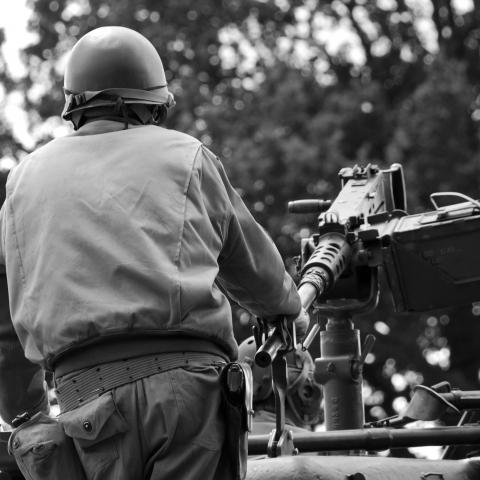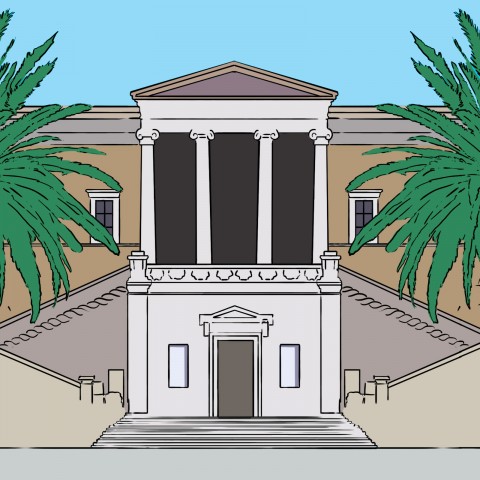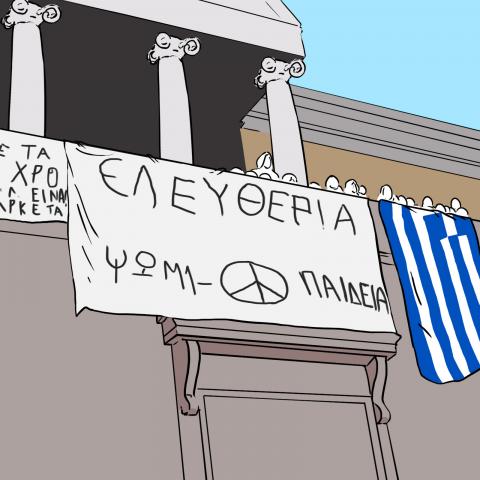Have you ever wondered what it really takes to bring about change?
On November 17, 1973, Athens, Greece, saw a massive tragedy take place all in the name of positive change. The Athens Polytechnic uprising consisted of university students—many of whom sacrificed themselves during protests—who were sick of the corrupted junta regime.
In this article, you’ll learn about what events took place on this date and how Greeks commemorate them today.

1. What was the Athens Polytechnic Uprising?

The Athens Polytechnic Uprising was a student-led protest against the so-called χούντα (húda), or “junta.” The junta, led by George Papadopoulos, was an extreme right-wing δικτατορία (diktatoría), or “dictatorship,” that actively took away the rights of Greek citizens, including their ability to have differing political opinions. Any Greek citizens who expressed a different πολιτική πεποίθηση (politikí pepíthisi), or “political belief,” were imprisoned, tortured, or exiled.
On November 14, 1973, a large group of students at the Athens Polytechnic school organized a mass protest by barricading themselves inside the building. One such student was Maria Damanaki, known for her role in the famous Athens Polytechnic Uprising radio transmission, calling for the people of Greece to come together against the junta. Later, Damanaki would become a leftist politician.
The school’s occupation continued until November 17, during which time many Greeks gathered near the school in a mixture of curiosity and support for the students. In the early morning hours, police broke the πανεπιστημιακό άσυλο (panepistimiakó ásilo), or “academic asylum,” that would normally protect students from harm, sending a tank in to knock down the university’s gates. Prior to this, the junta had also had several of the students professionally assassinated by snipers in nearby buildings. There was further Αιματοχυσία (ematohisía), or “bloodshed,” as students tried to flee the school grounds and were shot by police and snipers.
Each year, Greeks commemorate these tragic events and honor the memory of each brave student who protested the junta.
- → See our lesson on the Top 5 Things You Need to Know About Greek Society and the Top 5 Important Dates in Greece to learn more about modern-day Greece.
2. Traditions and Commemorations for the Uprising

To observe the Athens Polytechnic Uprising holiday, schools in Greece cease classes and instead host commemorative events. These often feature audiovisual material containing recordings or images from the event, including grainy footage from a Dutch reporter who had been there. People may also hear the recording of the uprising’s Σύνθημα (sínthima), or “motto”: Bread-Education-Freedom. At the Athens Polytechnic school, there are wreath-layings and speeches, and visitors leave carnation flowers at the site.
In addition to commemorative events, there are often demonstrations and protests, particularly at the American Embassy. This is because many Greeks believe that the United States aided and encouraged the junta. These events can become violent, so there are always police nearby to keep things in check.
Greeks tend to have mixed feelings concerning this holiday. On the one hand, many see it as a commemoration of a positive step forward; on the other, it’s a sad day that’s often marred by the violent protests.
3. Other Demonstrations Against the Junta

The 1973 Athens Polytechnic uprising was not the first student protest against the junta.
In 1970, a student named Kostas Georgakis committed suicide in protest of the regime. Later, in February 1973, students held a protest in a law school, asking for repeal of a law that allowed the junta to draft students by force.
These events are thought to have led up to the Athens Polytechnic Uprising, which shed light on issues regarding the junta.
4. Essential Vocabulary for the Uprising Commemoration

Let’s review some of the vocabulary words from this article!
- Αστυνομία (astinomía) – “police”
- Αιματοχυσία (ematohisía) – “bloodshed”
- άρμα μάχης (árma máhis) – “tank”
- Γεώργιος Παπαδόπουλος (Yeóryios Papadópulos) – “George Papadopoulos”
- Γκρεμίζω (gremízo) – “knock down”
- Δικτάτορας (diktátoras) – “dictator”
- Δικτατορία (diktatoría) – “dictatorship”
- Εκπέμπω (ekpémbo) – “broadcast”
- Ελευθερία (elefthería) – “freedom”
- Εθνικό Μετσόβιο Πολυτεχνείο (Ethikó Metsóvio Politehnío) – “National Technical University of Athens [NTUA]”
- Εξέγερση (exéyersi) – “uprising”
- Εξορία (exoría) – “exile”
- Κατάληψη (katálipsi) – “takeover”
- κεντρική πύλη (kendrikí píli) – “main gate”
- Μαρία Δαμανάκη (María Damanáki) – “Maria Damanaki”
- πανεπιστημιακό άσυλο (panepistimiakó ásilo) – “academic asylum”
- πολιτική πεποίθηση (politikí pepíthisi) – “political belief”
- ραδιοφωνικός σταθμός (radiofonikós stathmós) – “radio station”
- στρατιωτικό καθεστώς (stratiotikó kathestós) – “military regime”
- Φοιτητής (fititís) – “college student”
- Χούντα (húda) – “junta”
- Καταδιώκω (katadióko) – “pursue”
- Σύνθημα (sínthima) – “motto”
- επέτειος του Πολυτεχνείου (Epétios tu Politehníu) – “Athens Polytechnic Uprising”
Remember that you can find each of these words, along with their pronunciation, on our Athens Polytechnic Uprising vocabulary list.
Final Thoughts
The Athens Polytechnic Uprising was a tragic event that played a significant role in the eventual downfall of the junta.
What are your thoughts on the Polytechnic Uprising? Has there been a time in your country’s history when students or young people protested for major change? Let us know in the comments; we always look forward to hearing from you.
If you’re interested in learning more about Greek culture and the language, GreekPod101.com has several blog posts we think you’ll enjoy:
- Dormition of the Mother of God Traditions in Greece
- Greek Culture & Holidays: The Ohi Day Celebration
- Celebrating the Apokries Carnival in Greece
- Greek Etiquette, Manner, and Customs
- 10 Unique and Untranslatable Greek Words
This is only a small offering of everything that GreekPod101.com can offer you. If you’re serious about your language or culture studies, create your free lifetime account today. You’ll be speaking Greek in minutes, and fluent before you know it.
Happy learning, and stay safe out there!










